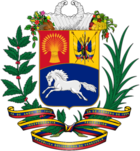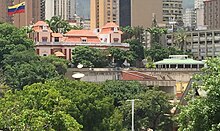Government of Venezuela
This article needs additional citations for verification. (March 2020) |
 |
|---|
|
Venezuela is a federal presidential republic.[1] The chief executive is the President of Venezuela who is both head of state and head of government. Executive power is exercised by the President. Legislative power is vested in the National Assembly.
Legislative power[]
Legislation can be initiated by the executive branch, the legislative branch (either a committee of the National Assembly or three members of the latter), the judicial branch, the citizen branch (ombudsman, public prosecutor, and controller general) or a public petition signed by no fewer than 0.1% of registered voters.
The voting age is 18, and voting is not compulsory.[2]
Executive power[]
The president is elected by a plurality vote with direct and universal suffrage for a six-year term.[3] A president may be re-elected perpetually (only in consecutive terms) as of 15 February 2009. The president appoints the Vice President.

The president decides the size and composition of the cabinet and makes appointments to it with the involvement[clarification needed] of the National Assembly.
There are currently 33 ministries and one state ministry. Each of these entities is headed by a minister.
| Office | Creation date, name change or merger | Ref |
|---|---|---|
| Office of the Presidency and Monitoring of Government Management | 2012 | [1] |
| Ministry of Internal Relations, Justice and Peace | 2013 | [2] |
| Ministry of Foreign Affairs | 1810 | [3] |
| Ministry of Economy and Finance | 2017 | [4] |
| Ministry of Defense | 1810 | [5] |
| Ministry of Tourism and Foreign Trade | 2019 | [6] |
| Ministry of Agriculture and Land | 2016 | [7] |
| Ministry of Fisheries and Aquaculture | 2016 | [8] |
| Ministry of Urban Agriculture | 2016 | [9] |
| Ministry of Education | 1881 | [10] |
| Ministry of Health | 1936 | [11] |
| Ministry of the Social Work Process | 2014 | [12] |
| Ministry of Housing and Habitat | 2005 | [13] |
| Ministry of Ecosocialism and Water | 2015 | [14] |
| Ministry of Petroleum | 2017 | [15] |
| Ministry of Planning | 2013 | [16] |
| Ministry of University Education | 2014 | [17] |
| Ministry of Science, Technology and Innovation | 2019 | [18] |
| Ministry of Communication and Information | 2002 | [19] |
| Ministry of Communes and Social Protection | 2009 | [20] |
| Ministry of Food | 2004 | [21] |
| Ministry of Culture | 2005 | [22] |
| Ministry of Youth and Sports | 2014 | [23] |
| Ministry of Indigenous Peoples | 2007 | [24] |
| Ministry of Women and Gender Equality | 2009 | [25] |
| Ministry of the Prison Service | 2011 | [26] |
| Ministry of Public Works | 2017 | [27] |
| Ministry of Land Transportation | 2017 | [28] |
| Ministry of Electric Power | 2009 | [29] |
| Ministry of Ecological Mining Development[4] | 2016 | [30] |
| Ministry of Water Attention | 2018 | [31] |
| Ministry of Industries and National Production | 2018 | [32] |
| Ministry of Commerce | 2018 | [33] |
State Ministries:
| Office | Creation date, name change or merger | Ref |
|---|---|---|
| Ministry of State for the New Peace Frontier | 2015 | [34] |
Former ministries include the Venezuelan Ministry of Infrastructure, which became the "Ministry of Public Works and Housing" and was split into the Ministry of Transport and Communications and the Ministry of Housing & Habitat in June 2010. The Ministry of Popular Economy became the "Ministry of Communal Economy" in 2007, and was merged into the Ministry of Communes and Social Protection on 3 March 2009, along with the Ministry of Participation and Social Protection.[5] In February 2010 the Ministry of Planning and Development was merged with the Ministry of Finance to form the Ministry of Planning and Finance.
Legislative branch[]
The National Assembly has 165 seats. Members are elected by popular vote to serve five-year terms. Each member may be re-elected for a maximum of ten additional terms. Three Assembly seats are by law reserved for the indigenous peoples of Venezuela. National Assembly elections were last held on 6 December 2015. When the National Assembly is not in session, its delegated committee acts on matters relating to the executive and in oversight functions. At various times throughout its history, Venezuela has had unicameral and bicameral legislative bodies.

- Venezuelan Congress, first one convened in 1811, replaced by the legislature of Gran Colombia
- Assembly organized by Simon Bolivar, convened once to ratify a decision
- Legislature of Gran Colombia
- Unicameral Congress of Venezuela first convened under the 1830 constitution
- Transitional Congress, convened mainly for the purpose of writing a new constitution
- Bicameral Congress, consisting of a Senate (the formerly unicameral Congress) and the Chamber of Deputies
- Unicameral National Assembly of 1999
- Transitional legislative committee
- Unicameral National Assembly, the current legislative body
Judicial branch[]
The judicial branch is headed by the Supreme Tribunal of Justice, which may meet either in specialized chambers (of which there are six) or in plenary session. The 32 justices are appointed by the National Assembly and serve 12-year terms. The judicial branch also consists of lower courts, including district courts, municipal courts, and courts of the first instance.
Citizens branch[]
The citizens branch consists of three components – the prosecutor general ("fiscal general"), the "defender of the people" or ombudsman, and the comptroller general. These officials of state, in addition to fulfilling their specific functions, also act collectively as the "" to submit to the Supreme Tribunal actions they believe are illegal, particularly those which violate the Constitution. The holders of the "citizen power" offices are appointed for seven-year terms by the National Assembly.
Electoral council[]
The National Electoral Council is responsible for organizing elections at all levels. Its members are elected to seven-year terms by the National Assembly.
See also[]
Notes[]
- ^ "Archived copy". Retrieved 30 May 2011.
- ^ Frankal, Elliot (4 July 2005). "Compulsory voting around the world". The Guardian. London. Retrieved 10 March 2007.
- ^ "Venezuela - The World Factbook". www.cia.gov. Retrieved 30 July 2021.
- ^ http://www.vtv.gob.ve/articulos/2016/06/07/creado-nuevo-ministerio-de-desarrollo-minero-ecologico-7161.html
- ^ (in Spanish) Ministry of Communes and Social Protection, 21 May 2009, "El Ministerio del Poder Popular para las Comunas no construye Comunas" Archived 23 March 2012 at the Wayback Machine
External links[]
 Media related to Government of Venezuela at Wikimedia Commons
Media related to Government of Venezuela at Wikimedia Commons
- Government of Venezuela
